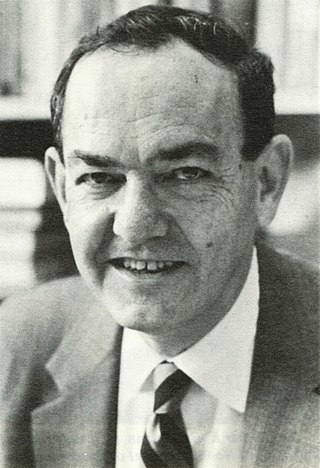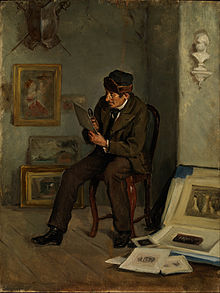
Herbert Alexander Simon was an American political scientist whose work also influenced the fields of computer science, economics, and cognitive psychology. His primary research interest was decision-making within organizations and he is best known for the theories of "bounded rationality" and "satisficing". He received the Nobel Memorial Prize in Economic Sciences in 1978 and the Turing Award in computer science in 1975. His research was noted for its interdisciplinary nature and spanned across the fields of cognitive science, computer science, public administration, management, and political science. He was at Carnegie Mellon University for most of his career, from 1949 to 2001, where he helped found the Carnegie Mellon School of Computer Science, one of the first such departments in the world.
In cognitive psychology, chunking is a process by which small individual pieces of a set of information are bound together to create a meaningful whole later on in memory. The chunks, by which the information is grouped, are meant to improve short-term retention of the material, thus bypassing the limited capacity of working memory and allowing the working memory to be more efficient. A chunk is a collection of basic units that are strongly associated with one another, and have been grouped together and stored in a person's memory. These chunks can be retrieved easily due to their coherent grouping. It is believed that individuals create higher-order cognitive representations of the items within the chunk. The items are more easily remembered as a group than as the individual items themselves. These chunks can be highly subjective because they rely on an individual's perceptions and past experiences, which are linked to the information set. The size of the chunks generally ranges from two to six items but often differs based on language and culture.

Constructivism is a theory in education which posits that individuals or learners do not acquire knowledge and understanding by passively perceiving it within a direct process of knowledge transmission, rather they construct new understandings and knowledge through experience and social discourse, integrating new information with what they already know. For children, this includes knowledge gained prior to entering school. It is associated with various philosophical positions, particularly in epistemology as well as ontology, politics, and ethics. The origin of the theory is also linked to Swiss developmental psychologist Jean Piaget's theory of cognitive development.
Cognitive apprenticeship is a theory that emphasizes the importance of the process in which a master of a skill teaches that skill to an apprentice.
The title mnemonist refers to an individual with the ability to remember and recall unusually long lists of data, such as unfamiliar names, lists of numbers, entries in books, etc. Some mnemonists also memorize texts such as long poems, speeches, or even entire books of fiction or non-fiction. The term is derived from the term mnemonic, which refers to a strategy to support remembering, but not all mnemonists report using mnemonics. Mnemonists may have superior innate ability to recall or remember, in addition to relying on techniques.
Competence is the set of demonstrable characteristics and skills that enable and improve the efficiency or performance of a job. Competency is a series of knowledge, abilities, skills, experiences and behaviors, which leads to effective performance in an individual's activities. Competency is measurable and can be developed through training.
Adaptive expertise is a broad construct that encompasses a range of cognitive, motivational, and personality-related components, as well as habits of mind and dispositions. Generally, problem-solvers demonstrate adaptive expertise when they are able to efficiently solve previously encountered tasks and generate new procedures for new tasks. This definition can be contrasted with more traditional ideas of expertise popularized by Chi and others, which do not typically consider adaptation to completely novel situations. Its empirical validity has been examined in a number of training and learning contexts. The term was first coined by Giyoo Hatano and Kayoko Inagaki, to tease out the variability within groups of experts. Hatano and Inagaki, described two types of expertise: routine expertise, or classic expertise, and adaptive expertise. They defined routine expertise as involving mastering procedures in such a way as to become highly efficient and accurate, whereas developing adaptive expertise requires an individual to develop conceptual understanding that allows the "expert" to invent new solutions to problems and even new procedures for solving problems. To illustrate, imagine two sushi chefs: one who makes every piece perfectly but routinely makes the same few types over and over, and one produces new menus frequently. To some, this is an unfair comparison, as ones' environment supports behavior. For example, the routine of the classic expert sushi chef may be tied to his restaurant environment, and this chef may be able to break out of the routines easily given a different situation. However, the adaptive expert chef clearly demonstrates flexible knowledge and performance of sushi-making. Learning Scientists are interested in adaptive expertise, in part because they would like to understand the types of learning trajectories that may allow practitioners break free from routines when necessary.
Transactive memory is a psychological hypothesis first proposed by Daniel Wegner in 1985 as a response to earlier theories of "group mind" such as groupthink. A transactive memory system is a mechanism through which groups collectively encode, store, and retrieve knowledge. Transactive memory was initially studied in couples and families where individuals had close relationships but was later extended to teams, larger groups, and organizations to explain how they develop a "group mind", a memory system that is more complex and potentially more effective than that of any of its individual constituents. A transactive memory system includes memory stored in each individual, the interactions between memory within the individuals, as well as the processes that update this memory. Transactive memory, then, is the shared store of knowledge.
Practice is the act of rehearsing a behaviour repeatedly, to help learn and eventually master a skill. The word derives from the Greek "πρακτική" (praktike), feminine of "πρακτικός" (praktikos), "fit for or concerned with action, practical", and that from the verb "πράσσω" (prasso), "to achieve, bring about, effect, accomplish".
K. Anders Ericsson was a Swedish psychologist and Conradi Eminent Scholar and Professor of Psychology at Florida State University who was internationally recognized as a researcher in the psychological nature of expertise and human performance.
In mental memory, storage is one of three fundamental stages along with encoding and retrieval. Memory is the process of storing and recalling information that was previously acquired. Storing refers to the process of placing newly acquired information into memory, which is modified in the brain for easier storage. Encoding this information makes the process of retrieval easier for the brain where it can be recalled and brought into conscious thinking. Modern memory psychology differentiates between the two distinct types of memory storage: short-term memory and long-term memory. Several models of memory have been proposed over the past century, some of them suggesting different relationships between short- and long-term memory to account for different ways of storing memory.
CHREST is a symbolic cognitive architecture based on the concepts of limited attention, limited short-term memories, and chunking. The architecture takes into low-level aspects of cognition such as reference perception, long and short-term memory stores, and methodology of problem-solving and high-level aspects such as the use of strategies. Learning, which is essential in the architecture, is modelled as the development of a network of nodes (chunks) which are connected in various ways. This can be contrasted with Soar and ACT-R, two other cognitive architectures, which use productions for representing knowledge. CHREST has often been used to model learning using large corpora of stimuli representative of the domain, such as chess games for the simulation of chess expertise or child-directed speech for the simulation of children's development of language. In this respect, the simulations carried out with CHREST have a flavour closer to those carried out with connectionist models than with traditional symbolic models.
EPAM is a psychological theory of learning and memory implemented as a computer program. Originally designed by Herbert A. Simon and Edward Feigenbaum to simulate phenomena in verbal learning, it has been later adapted to account for data on the psychology of expertise and concept formation. It was influential in formalizing the concept of a chunk. In EPAM, learning consists in the growth of a discrimination network. EPAM was written in IPL/V.
The worked-example effect is a learning effect predicted by cognitive load theory. Specifically, it refers to improved learning observed when worked examples are used as part of instruction, compared to other instructional techniques such as problem-solving and discovery learning. According to Sweller: "The worked example effect is the best known and most widely studied of the cognitive load effects".
Domain-general learning theories of development suggest that humans are born with mechanisms in the brain that exist to support and guide learning on a broad level, regardless of the type of information being learned. Domain-general learning theories also recognize that although learning different types of new information may be processed in the same way and in the same areas of the brain, different domains also function interdependently. Because these generalized domains work together, skills developed from one learned activity may translate into benefits with skills not yet learned. Another facet of domain-general learning theories is that knowledge within domains is cumulative, and builds under these domains over time to contribute to our greater knowledge structure. Psychologists whose theories align with domain-general framework include developmental psychologist Jean Piaget, who theorized that people develop a global knowledge structure which contains cohesive, whole knowledge internalized from experience, and psychologist Charles Spearman, whose work led to a theory on the existence of a single factor accounting for all general cognitive ability.
The Dreyfus model of skill acquisition is a model of how learners acquire skills through formal instruction and practicing, used in the fields of education and operations research. Brothers Stuart and Hubert Dreyfus proposed the model in 1980 in an 18-page report on their research at the University of California, Berkeley, Operations Research Center for the United States Air Force Office of Scientific Research. The model proposes that a student passes through five distinct stages, originally described as: novice, competence, proficiency, expertise, and mastery.
Procedural memory is a type of implicit memory which aids the performance of particular types of tasks without conscious awareness of these previous experiences.
Perceptual learning is learning better perception skills such as differentiating two musical tones from one another or categorizations of spatial and temporal patterns relevant to real-world expertise. Examples of this may include reading, seeing relations among chess pieces, and knowing whether or not an X-ray image shows a tumor.
The expertise reversal effect refers to the reversal of the effectiveness of instructional techniques on learners with differing levels of prior knowledge. The primary recommendation that stems from the expertise reversal effect is that instructional design methods need to be adjusted as learners acquire more knowledge in a specific domain. Expertise is described as "the ability to perform fluently in a specific class of tasks."

Fernand Gobet is a cognitive scientist and a cognitive psychologist, currently Professor of Cognitive Psychology at the London School of Economics. His research interests focus on the study of cognition, especially in the areas of cognitive architectures, perception, intuition, problem solving, learning and decision making. He has developed the CHREST cognitive architecture, an acronym for Chunk Hierarchy and REtrieval STructures, which is a complete architecture for the processes of learning and perception used by humans. He is a chess International Master, and played numerous times for the Swiss national team. He was co-editor of the Swiss Chess Review from 1981 to 1989. His Elo rating is 2400.



